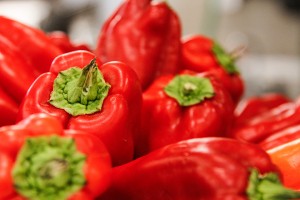
Constance Atton | Lariat Photographer
By Elly Spencer
Reporter
November brings changing colors, fall weather, Thanksgiving and the oncoming final exam season.
What most people don’t know is that it also brings World Vegan Month, established by the world’s first Vegan Society in 1944.
Veganism is a dietary lifestyle excluding all animal products, including eggs, milk, meat, dairy products and butter.
The statistics for American vegan and vegetarian practices are increasing yearly, showing more and more people inclined toward a meat and animal product-free diet.
According to a 2012 study by the Vegetarian Times, approximately 3.2 percent of all Americans are vegetarian, and only 0.5 percent of those people are strictly vegans.
A 2004 student survey from Aramark concluded that 25 percent of college students said having vegan food options on campus was important to them. Luckily for them, Baylor dining does in fact offer vegetarian and vegan options.
2013 Baylor graduate Alexander Wheaton said even so, these options are limited.
Wheaton moved into a vegan diet when he was a freshman at Baylor and said the biggest obstacle was the lack of variety.
“The biggest challenges to being vegan at Baylor were obviously the limited options,” Wheaton said. “Freshman year living in Penland, I was basically on a diet of French fries.”
Wheaton and many other students said their choice was driven by moral or ethical reasons.
“I decided to be vegan for environmental reasons,” Wheaton said. “Vegans are estimated to require one-tenth as much land to grow their food as the average omnivorous person because animals require more land for grazing, as well as the land it takes to grow the food that they eat.”
A 2011 study from Technomic, a food service company, concluded that 21 percent of American college students practice vegetarian, vegan or meat-excluded diets.
College students face many pros and cons when choosing a vegan lifestyle, according to Janelle Walter, Baylor’s nutrition sciences program coordinator.
“You will certainly get your vitamins A, C, E, and K, and you’ll have a diet high in fiber,” Walter said. “You have to be very knowledgeable in putting plant sources of amino acids together so you will get the essential amino acids needed to sustain life.”
Health concerns and a positive change in lifestyle are huge reasons college students make the transition into a vegan lifestyle.
Sedalia, Colo., junior Hannah Dickey started a vegan diet in Aug. 2013, after health complications left her with no other options.
“I didn’t get to choose to be vegan,” Dickey said. “I had a really bad gallbladder disease that did some pretty bad damage to my lower intestine and stomach lining.”
Dickey said that while it can be difficult to substitute a healthy, balanced meal with a vegan lifestyle, it is not impossible if done carefully and consciously.
There are several Waco restaurants that offer vegan and vegetarian options and substitutions, such as Chipotle, Olive Garden, Panera and even Burger King.
While there is a resounding theme of hard choices and difficult dietary restrictions, there is also a theme of feeling better because of choosing a healthier diet.
“I feel healthy, I have more energy, I will never gain the freshman 15, and I don’t have to worry about will power or self control with the food I can’t eat,” Dickey said.





